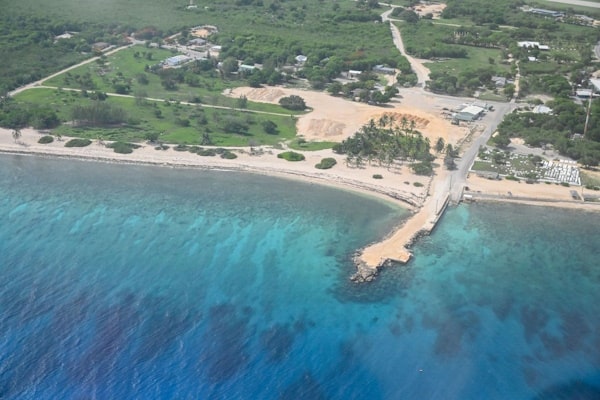Advisor raises option of alternative justice
 (CNS): Police in Cayman are unable to exercise any discretion when it comes to offences, leaving all charging decisions to the director of public prosecutions (DPP), who has a stark choice between charging or dismissing. As a result. the country may be missing out on alternative ways of addressing less serious crime that could reduce the number of petty offences that find their way to the courts and give people an opportunity to avoid being sucked into the criminal justice system and a revolving door of jail and crime for many petty offenders.
(CNS): Police in Cayman are unable to exercise any discretion when it comes to offences, leaving all charging decisions to the director of public prosecutions (DPP), who has a stark choice between charging or dismissing. As a result. the country may be missing out on alternative ways of addressing less serious crime that could reduce the number of petty offences that find their way to the courts and give people an opportunity to avoid being sucked into the criminal justice system and a revolving door of jail and crime for many petty offenders.
Claire Wetton, an advisor from the UK who conducted a review of the local criminal justice system this year, has recommended that the local authorities consider developing restorative justice, diversion policies or options for out of court disposals, such as cautions that would receive nominal or financial penalties.
Wetton said in her report that the RCIPS is not able to authorise charges apart from traffic ticket cases, with the only possible alternative to charge or release being an informal warning, which is understood to have no real consequences.
“There is no formal system for out of court disposals. As result, there are a number of cases that are flowing through the court process and which ultimately result in a low-level disposal,” she said in her report.
Pointing out the consequences, Wetton said this situation leads to some defendants remanded in custody because they cannot meet bail conditions for often petty offences. She also pointed to the work involved in the process, from the police generating a criminal file, the DPP reviewing it, as well as the various court hearings. Wetton said an out of court disposal system would reduce that work, as she pointed to a body of evidence to suggest that this could improve public confidence and reduce re-offending – a significant problem for Cayman, which has a particularly high rate of recidivism.
Wetton suggested an alternative disposal for low-level offending that would result in a nominal penalty. She said this would require legislation but there is already similar legislation in at least one other UK territory that could provide a model that could reduce the burden on Cayman’s overstretched courts.
The current situation is significantly problematic and may be leading to unnecessary damage to the future of many offenders. With the option for the authorities simply between prosecution or no further action, suspects in minor cases are being charged. People then acquire criminal records that damage their future, employability and ability to travel overseas, not just for minor possession of ganja but consumption as well.
Charges for ganja possession and disorderly conduct dominate the Summary Court listings and are increasing the volume of cases going through the police, DPP and courts. Wetton indicated that many of these cases could be dealt with differently. The use of cautions, conditional cautions, such as compensation payments for minor criminal damage matters, and youth cautions could be recorded on appropriate registers without creating formal criminal records.
Commissioner of Police David Baines has on a number of occasions indicated his desire to use fixed penalty fines for possession of small quantities of drugs. The police often use the drug laws to stop and search suspects in connection with other offences but when they stop a suspect and find no evidence of other crime, if they find even a small quantity of drugs, the zero tolerance policy means they are obligated by law to make an arrest and begin the prosecution process.
Another option open to the local criminal justice system is restorative justice, which Prison Director Neil Lavis recently spoke of during an interview with Radio Cayman’s “On the Record”, but as yet the system has not been formally adopted. Restorative justice enables victims to meet or communicate with their offenders to explain the real impact of the crime. As well as empowering victims by giving them a voice, it holds offenders to account for what they have done and helps them to take responsibility and make amends.
This is not easy option for offenders and is said to be incredibly challenging for them to confront the personal impact of their actions, while victims say meeting the person who has harmed them can be a huge step in moving forward and recovering from the crime. Restorative justice can be used for any type of crime and at any stage of the criminal justice system, including alongside a prison sentence.
In the UK research demonstrates that restorative justice provides an 85% victim satisfaction rate and a 14% reduction in the frequency of re-offending. It also led to £8 (CI$10) in savings to the criminal justice system for every £1 spent on restorative justice. Analysis by the Restorative Justice Council and Victim Support found that providing restorative justice in 70,000 cases involving adult offenders would deliver £185 million in cashable cost savings to the criminal justice system in Britain in just two years through reductions in reoffending alone.




































Back it up…”Kids having babies” is the problem throughout the Caribbean. We need more and earlier birth control education on this topic to prevent the creation of future offenders; a public discussion on the responsibilities of planned parenthood/marriage, and the required sacrifices in raising responsible children. As a father to a teen daughter I can tell you, there is not nearly enough, even at the expensive private schools. Education is the easiest, cheapest, and most proactive way to end the Caribbean’s most expensive cycle of preventable social issues.
Finally! While I am not familiar with the Police Caution from the UK, I wholeheartedly agree that there should be an expeditious way to deal with misdemeanor matters.
Another option would be a 24 hour magistrate or an extensive fixed penalty ticket system to deal with these matters. So many other countries have these systems in place. Simple offences: fixed penalty tickets (obvious contravention of the laws within the view of an Officer) to a 24 hour magistrate who can dispense fines after being presented with a incident there and then (example: drunk and disorderly).
This will save the Country thousands of dollars and create revenue!
HI CNS, can we get a story on the new banking charge of CI$50 to buy US island wide?
CNS: First I’ve heard of it. Can you send details? By comment or by email info@caymannewsservice.com . Thanks.
Police don’t have discretion? Have you ever tried to have someone arrested for committing a crime against you or your business here in Cayman? The local Police do whatever they can to talk you out of filing charges. Having moved here from another country, I just assumed that the filing of charges in Cayman was at the option of the victim, given the actions of the local Police. In one case, I had an officer who showed up at our business with recovered stolen goods tell me that I could no longer file charges as the goods had been returned. I suspect the real problem is in the quality of education and training of the Police officers that actually come into contact with the general public. Change the laws all you want…until the beat officers can accurately fill out the required paperwork, nothing is going to change. A good place to start would be with basic literacy and integrity testing of all serving officers.
Most of our police are NOT “local”
Do not worry. We cannot put it in file #13. There is no room. It is already full with immigration applications.
This sounds very like a suggestion that RCIPS should adopt the UK system of ‘Police Cautions’. If we are going down this road I would suggest treading very carefully because it is wide open to abuse and in the past some very serious offenders (the last instance was reported in the press yesterday) have been let off. The problem with police cautions is that many forces regard them as a ‘quick fix’ to staffing and manpower problems because issuing a caution takes maybe 10 minutes whereas taking the offender to court ties up officers for a day or more.
A better option is to use more solitary confinement. People are more scared of it and those in jail in solitary do not mingle with other criminals. Longer sentences for the young would also help as they are the likeliest to reoffend.
that really works in the USA which locks up more of its citizens that anywhere else.
“Longer sentences for young offenders?”. Are you nuts? Longer time in the crime university? Think about what you just wrote!
Solitary confinement means no contact with criminals so the end of “crime university”
Whetton is shining a light into a deep, dark pit here. Good creative thinking, because far too many youngsters are thrown under the bus for petty offenses, and thereafter labeled “Criminal” and denied jobs that they need. The present system also leads to negativity towards, and rejection of, the police, who need badly to foster better relations with the youngsters. Please do not put this in “File #13”.